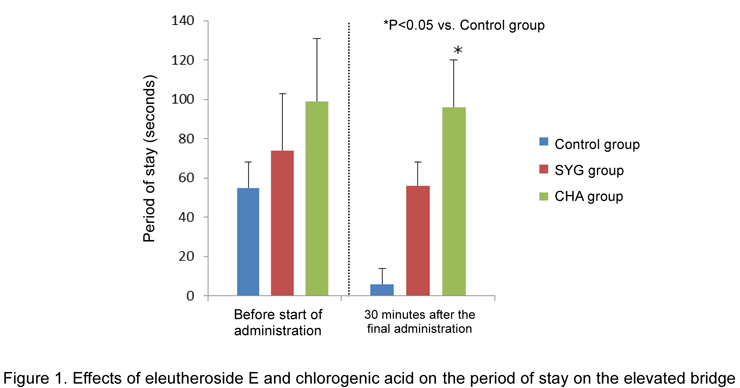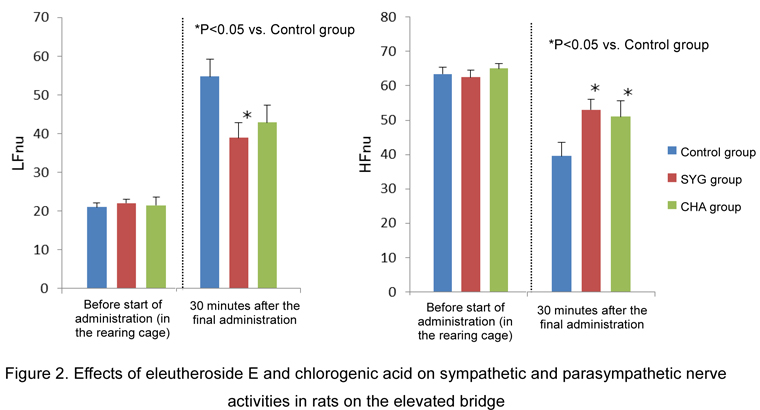- TOP
- List of reports
- Effect of Acanthopanax senticosus root component on autonomic nerve activity and anxiety
Effect of Acanthopanax senticosus root component on autonomic nerve activity and anxiety
【Scientific information】
Research and Development Department, Sun Chlorella Corporation
Effect of Acanthopanax senticosus root component on autonomic nerve activity
and anxiety
Presented at the 137th Annual Meeting of the Pharmaceutical Society of Japan (2017)
- Study objectives
- When excessively stressful conditions persist, the action of autonomic nerves (the balance between the activities of sympathetic and parasympathetic nerves) becomes disturbed, resulting in physical and mental disorders. At the annual meetings of the Pharmaceutical Society of Japan in 2015 and 2016, we reported that Acanthopanax senticosus (AS) shows a regulatory action on the autonomic nervous system in anxiety stress model rats. In order to determine components with the autonomic nerve regulating action, the effects of eleutheroside E and chlorogenic acid, key components of AS, were investigated.
- Study method
- After 1 week of acclimatization, a wireless telemeter was attached to each of a group of 7-week-old Sprague-Dawley (SD) strain male rats to investigate the action of autonomic nerves. The rats were divided into 3 groups, the control group, the eleutheroside E (SYG) group, and the chlorogenic acid (CHA) group. SYG (8 mg), CHA (10 mg), and water were administered to the SYG, CHA, and control groups, respectively, for one week. On the day of the test, the rats were placed on the edge of an elevated bridge (190 cm high; an approximately 9-cm wide bridge with no wall on either side) for height stress (fear, anxiety stress) loading 30 minutes after the administration. The period that they remained there until moved to a safe room 120 cm from the edge (period of stay) was measured and the action of autonomic nerves was investigated.
- Results
- Rats placed on the elevated bridge and experienced fear and anxiety immediately move into a safe room installed on the elevated bridge. In the control group, the period of stay substantially decreased at measurement 30 minutes after the final administration as compared with that before the start of administration, whereas there was no reduction in the period of stay in the CHA group, and a significant extension was observed also in comparison with the control group. Also, there was no reduction in the period of stay in the SYG group (Figure 1). For the effect on sympathetic nerve activity, in the control group, sympathetic nerve activity (LFnu) significantly increased on the elevated bridge as compared with the status in a rearing cage, whereas increase in LFnu was significantly inhibited in the SYG group. There was no significant difference between the CHA and the control groups (Figure 2). In addition, in the control group, parasympathetic nerve activity (HFnu) significantly decreased on the elevated bridge as compared with the status in the rearing cage, whereas the decrease in HFnu was significantly inhibited in the SYG and CHA groups as compared with the control group (Figure 2).
- The effects of SYG and CHA on autonomic nerve activities are summarized in Table 1.
The results of this study demonstrated that eleutheroside E and chlorogenic acid are involved in autonomic nerve regulating action of AS in rats experiencing fear and anxiety. Eleutheroside E and chlorogenic acid exhibit different effects on behaviors and autonomic nerve activities in rats on the elevated bridge, suggesting that anti-anxiety effect of AS results from combined action of these components.



Terminology
- * LFnu (low-frequency normalized unit)
- an index of sympathetic nerve activity obtained from frequency analysis of electrocardiogram
- * HFnu (high-frequency normalized unit)
- an index of parasympathetic nerve activity obtained from frequency analysis of electrocardiogram
Details
- Academic society:
- The 137th Annual Meeting of the Pharmaceutical Society of Japan (2017)
- Title:
- Effect of Acanthopanax senticosus root component on autonomic nerve activities and anxiety
- Authors:
- Yuki Yamanaka1 , Rina Kato1 , Yuna Kato1 , Shohei Miyazaki1,4, Miwa Nakagawa1,4, Hirotaka Oikawa1,4, Sachiyo Nakao1,2,4, Hideo Takekoshi3 , Masako Hoshizaki3 , Masato Ogata1,2,4, Takahiko Fujikawa1,2,4
- Affiliation:
- 1. Department of Pharmaceutical Sciences, Suzuka University of Medical Science; 2 Faculty of Medicine, Mie University Graduate School of Medicine; 3 Sun Chlorella Corp.; 4 Graduate School of Pharmaceutical Sciences, Suzuka University of Medical Science





